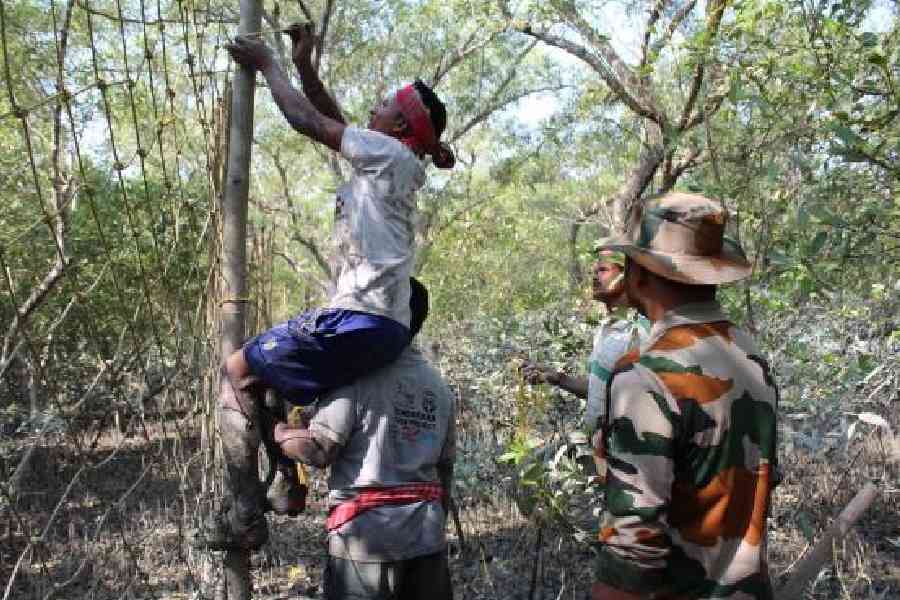Two panchayats in the Sunderbans have given a written undertaking to the forest department that fishermen will not breach nylon nets bordering the forest and villagers will not dump dead livestock along the riverbank.
Tigers from the forests strayed near villages in the Sunderbans on the other side more than 15 times between September last year and June this year. Breaches in the nets caused naturally and by humans — mostly fishermen looking to venture into forbidden waters illegally — were one of the main reasons for the intrusions, foresters said. In at least a couple of cases, the big cats were lured by the smell of cattle carcasses dumped along the riverbank.
A majority of the intrusions were reported from three panchayat areas in Kultali, under the Maipith Coastal Police Station. Two of the three panchayats — Maipith Baikunthapur and Gurguria-Bhubeneswari — provided the “commitment letters” on Saturday. July 26 is celebrated as World Mangrove Day.
The panchayats comprise villages like Nagenabad, Kishorimohanpur, Ambikanagar, Baikunthapur, Binodpur, Madhya Gurguriya, Purba Gurguriya, Debipur and Bhubaneswari. On the other side of the river are forest compartments of Ajmalmari 1 and 11 and Herobhanga 9, part of the Raidighi range, one of three tiger ranges in the South 24-Parganas forest division.
Jyotsna Halder, who heads the Maipith-Baikunthapur GP, told Metro: “We have been sensitising our people. Not only have fishermen been asked not to cut nets, they have also been encouraged to report even a minor breach to the forest department.”
Representatives of NGOs that have been working with the villagers and the forest department in the mangrove delta said discussions are in progress with representatives of the third, Deulbari panchayat.
“A written commitment from a gram panchayat for conservation and coexistence is unprecedented in the Sunderbans. It has taken years of groundwork,” said Abhishek Ghoshal, head of the human-wildlife conflict mitigation division, Wildlife Trust of India (WTI).
The gaps in the nets have been enabling the big cats to sneak out of the forests and reach human habitats on the other side of the rivers and creeks. A facelift, which will include a repair-and-replace job, is imminent. But the work is yet to begin.
So far, there have not been any deaths on either side in the tiger intrusions. But a member of a quick response team had a close shave earlier this year.
On February 9, a tiger sneaked out of Ajmalmari forest and sought refuge in a snake gourd field in a village across the river. The tiger, an adult male, mauled a member of the quick-response team before being captured in a trap cage on February 11.
The forest guard had intervened to save a man who had climbed a tree in fear of the big cat. The guard needed reconstructive surgery at SSKM Hospital.
“The resolutions taken by the panchayats are a step in the right direction. Even a small breach makes the entire net vulnerable. Dumping dead animals on the riverbank is also dangerous,” said an official of the South 24-Parganas forest division.











